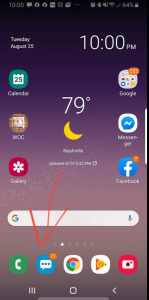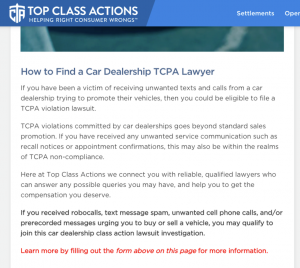I think
@john.quinn and I are on the same page. In my review of the TCPA laws over the last few years, and I am also not a lawyer, actions taken when it comes to a phone number aren't separated by text or voice call when it comes to a human dialing. TCPA sees them as the same thing. We don't call people to see if we can call them...
We don't have any automated text campaigns hitting marketing lists as that does get into Opt-In rules and from what I can tell, is where most all lawsuits derive from (show me one that didn't). We use a phone number that a customer has provided for text and/or phone and see those actions against that number as the same thing. If they submitted a number on the lead form, we have green light on text and call with no opt-in. We have 90-days to attempt contact if they're on the DNC list but obviously can take a hint after a much shorter time if we get no response. We have 18 months to market to their number if they transacted with us.
The advertised fear and a dealer's unwillingness to research the rules on their own provide many sales opportunities for vendors in this space. Not saying that's you but if a dealer sees value in letting someone do it (as long as they get indemnification) because then they don't have to worry about it, go for it.
Change my mind
@todd.smith
...and I do agree, texting is where it's at.
Ok, Dan not sure if it will change your mind or John's, but I figured this would be good for everyone to read. I have spent enough time with lawyers over the last couple of years trying to interpret the law and here are my thoughts. Let me say first I am
NOT a lawyer and I don't represent one on DealerRefresh or any other place on earth. I threw some background in there just to help people understand this from a larger perspective.
Background
The TCPA, or
Telephone Consumer Protection Act, was originally passed by Congress in 1991 to regulate the use of auto-dialers and pre-recorded messages in order to protect consumer privacy. Now, the TCPA regulates text messages, telemarketing calls, auto-dialed calls, prerecorded calls, and unsolicited faxes. This is also the authority that creates and maintains the National “Do-Not-Call” list.
In 2015, the Federal Communications Commission (
FCC) released its TCPA Omnibus Declaratory Ruling and Order in order to clarify the rules and regulations of the TCPA.
Key Terms
TCPA—Telephone Consumer Protection Act
FCC—
Federal Communications Commission. The regulatory force behind the TCPA.
ATDS—
Automatic Telephone Dialing System or
Auto-Dialer.
Any technology with the potential capacity to dial random or sequential numbers, regardless of whether the technology has the current capacity to make the call in issue & equipment to send internet-to-phone text messages.
Text Messages— In the TCPA, text messages are “calls”.
Telemarketing— telephone solicitation.
“Telephone solicitation” means the initiation of a telephone call or message for the purpose of encouraging the purchase or rental of, or investment in, property, goods, or services, which is transmitted to any person, but such term does NOT include a call or message
To any person with that person’s prior express invitation or permission
To any person with whom the caller has an established business relationship, or
By a tax-exempt nonprofit organization
Overall, car dealerships can ensure they are TCPA compliant by following a few outstanding principles. Below are key takeaways for businesses regarding the TCPA and its recent ruling.
Prior Express Written Consent
Previously, the secondary portion of the “telephone solicitation” definition of the TCPA allowed businesses to text consumers purely on the basis of an “established business relationship”. Now, businesses must receive “prior express written consent” before telemarketing, advertising, or texting from an ATDS (auto-dialer), prerecorded device, or any kind of software solution. Written consent can be captured through email, with a written signature, by checking a box on an online form, or by voice recording. However, you may not send an ATDS text to request a recipient to opt-in.
Text Messaging Software vs. Personal Phones
The FCC’s current definition and interpretation of an ATDS is extremely broad, and not limited by how the equipment actually functioned when making a call or sending a text message. Text Communications Solution software as well as an employee’s personal smartphone can both be considered an ATDS; several other factors, including the content and frequency of the messages, come into play. Because of this vagueness, it’s prudent for businesses to assume that their method of communication most likely falls under TCPA regulation, and seek out the proper authorization prior to initiating text conversations with consumers.
Transactional and Informational vs. Marketing Texts
There is some gray area between what is an informational text, and what could be construed as a marketing or sales solicitation text. For example, some Text Messaging Solution Providers explain that if a business sends a non-commercial text to an individual, specific to an agreed-upon relationship such as the consumer providing their mobile phone number, they do not need specifically required written consent. This is only 100% in cases concerning services that have already been purchased.
Example
Imagine a service department customer bringing in their car for an oil change, but a dealership employee texts them to notify them that they also need new tires. Technically, it could be argued that this message is not within the scope of the exception, and count as marketing messages to sell other automotive services or products.










